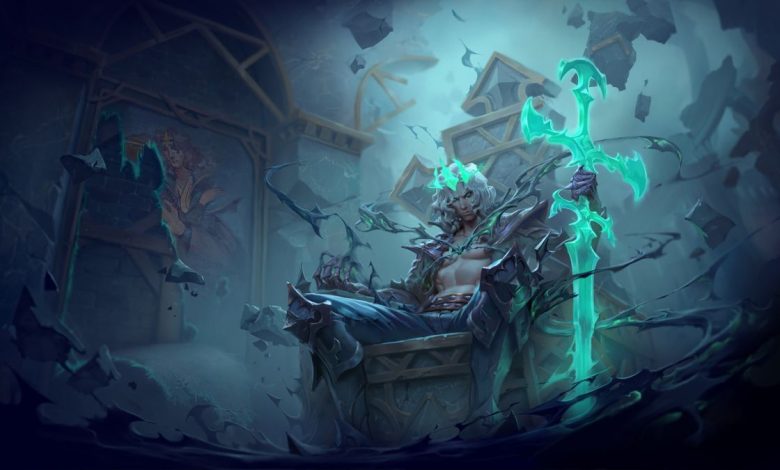
For some time now, the well-known Riot Games has stopped "limiting" its activities exclusively to the famous League of Legends game. It started with Netflix's animated hit series Arcane, while in the gaming industry, the establishment of subsidiary Riot Forge followed the announcement of a series of games inspired by the LoL universe. A few days ago a platform/rhythm game called Hextech Mayhem was released (whose review will be available on our site soon), while an action/platform (Conv/regence) and a fighting game (tentatively named Project L) have already been announced for the near future.
However, Riot's first real attempt to present a different take on the LoL universe from its famous moba roots is the Ruined King we review here. In a highly insightful move, Riot Forge has chosen Airship Syndicate as the development team for its first RPG. A team whose work has nothing but positives to show for it, both with the very good Battle Chasers: Nightwar and the wonderful Darksiders spin-off, Genesis.
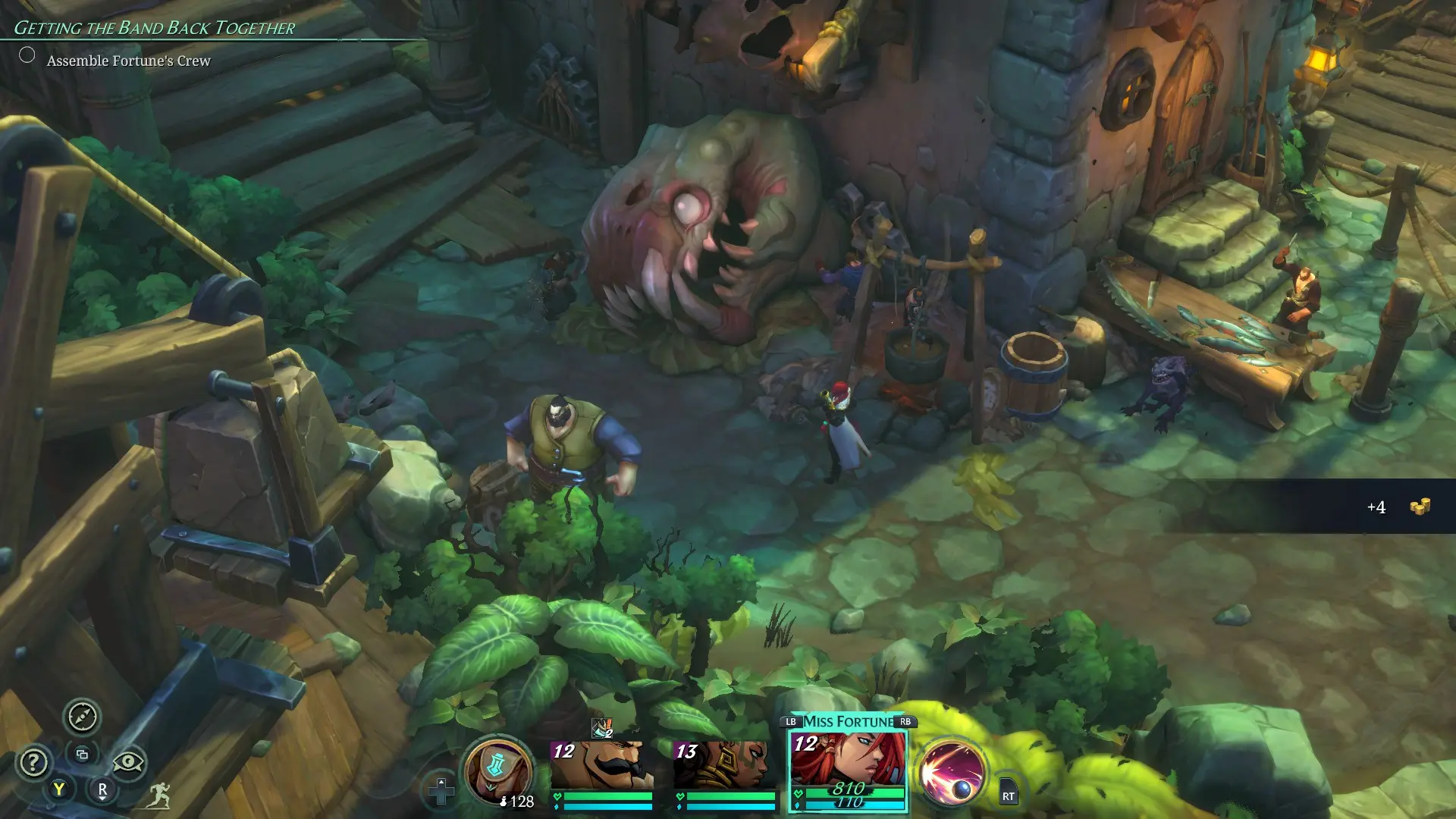
Of course, bad tongues would say that Ruined King is nothing more than a reskin of Battle Chasers, hence the relatively short development time compared to the game's initial announcement. While the game may indeed share many common elements with Airship Syndicate's first game, in practice it turns out to be a significantly improved version of that game, which fixes most of its flaws. At the same time, it also leaves a lot of promise for an even better potential sequel to Battle Chasers, though that's not the case at the moment.
Ruined King is a heavily story-based RPG, featuring a fairly interesting story, even for those who aren't LoL devotees. In the port of Bilgewater, the red-haired "pirate" Miss Fortune has just managed to gain town's control from the hands of Gangplank, after a fierce battle. However, she will not celebrate her victory for long, as some malevolent spirits (Mistwalkers), products of a mysterious Black Mist, have begun wreaking havoc on the town, starting with Miss Fortune's own estate. At the same time, new faces begin to appear in Bilgewater, such as Braum and Yasuo, each for different reasons that may (or may not) be connected to the sudden appearance of Black Mist.
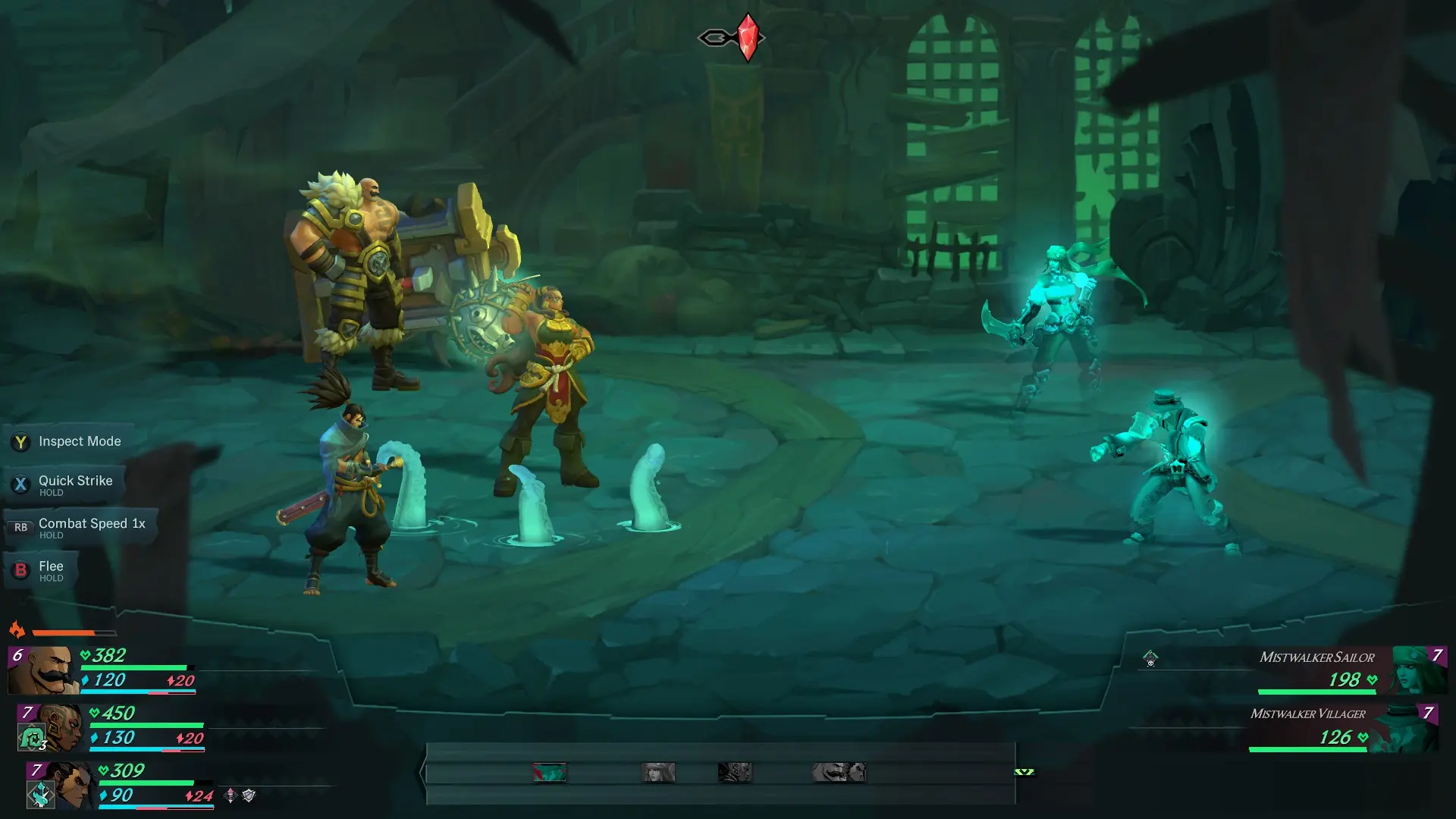
Sooner or later, the six heroes of the story (all champions of the "normal" League of Legends) will end up forming a team, with the final destination being the infamous Shadow Isles, which is probably the "heart" of the Black Mist. But who is responsible for the Mistwalkers' awakening, and what role does the so-called Ruined King play?The answer is found on your screen, in a story that doesn't amaze with its originality, but is well-written, with some dialogue and cutscenes shedding light on its darker aspects, while making sure it doesn't ramble so much that it becomes tedious.
In general, the storytelling element is excellent, to such an extent that it makes the player interested in the outcome of the story and especially its characters. A cast of characters that proves to be very likable, with the noticable differences in their appearance and mannerism creating a memorable "dysfunctional" fellowship. For example, Yasuo plays the classic "lone wolf" fencer who acts more than talks, Braum is the typical huge warrior with muscle even in his brain, while the dogmatic Illaoi has a highly serious and cynical demeanor.
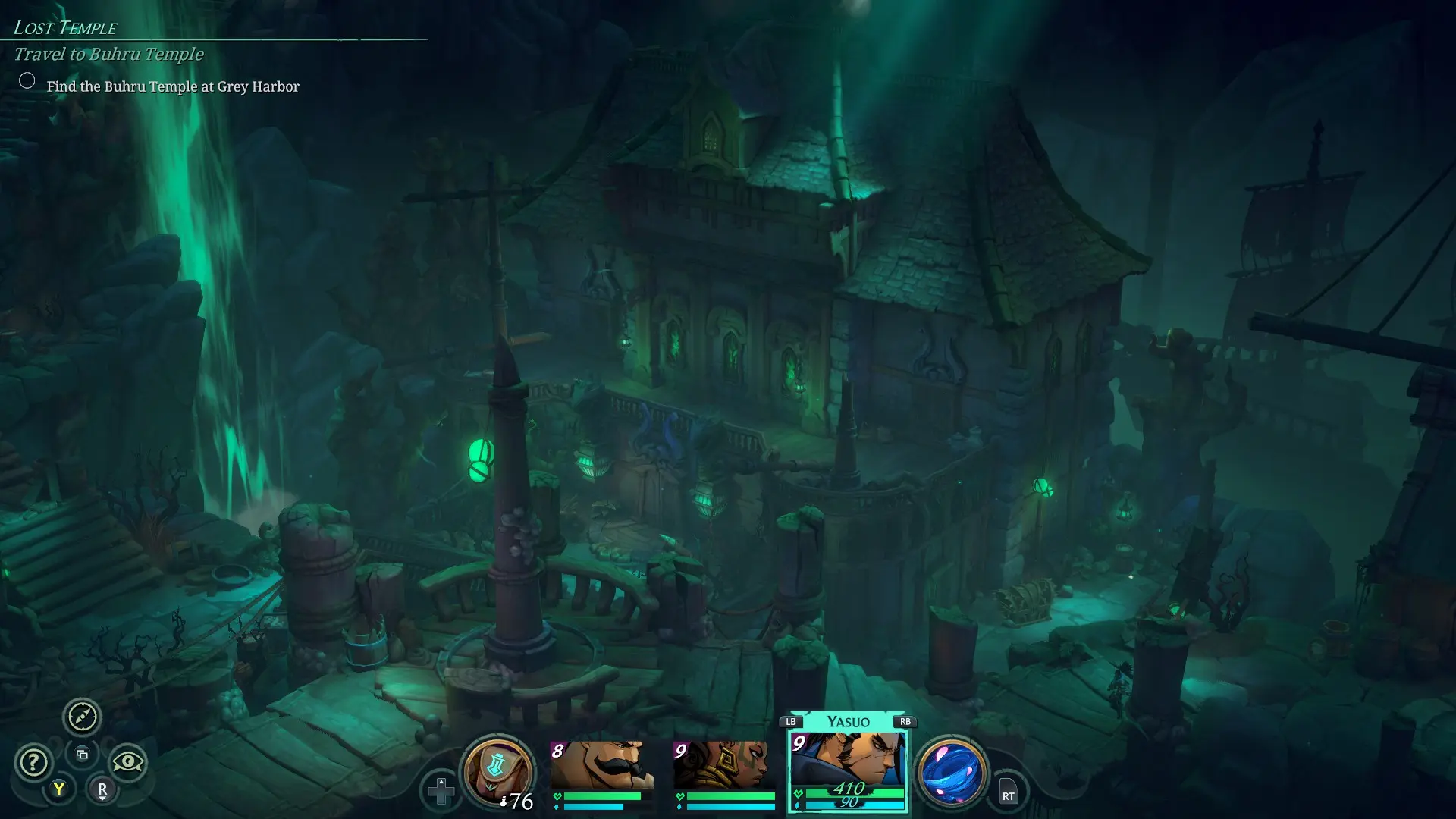
Of course, a good story alone is not enough to support a quality RPG, but Ruined King does just as well outside of it. Moving more along the lines of JRPGs, our main activities revolve around exploring dungeons under an isometric perspective, taking on quests (main and side), collecting plenty of loot, and obviously, battles. Battles that are purely turn-based and adopt a Final Fantasy X-type pattern - thankfully without any sort of random encounter. When a battle is started, each faction's members consist of up to three people, and each person's initiative depends on the timeline bar at the bottom of the screen.
Some actions can be performed instantly (such as simple attack, defense, potion use or Ultimate moves) and usually stack on some attribute (such as overcharge that substitutes mana for the duration of the battle), while more powerful ones require more time, but naturally have more potential. However, the most interesting aspect of the battles is the mechanism of the three Lanes, on which the outcome of a battle often depends. Each ability and/or spell by default is in the Balance Lane, but with the click of a button we can move it to the Speed Lane or the Power Lane to alter its performance. The same ability in Speed Lane will reduce its execution time, but at the expense of effectiveness, while with Power Lane the exact opposite results.
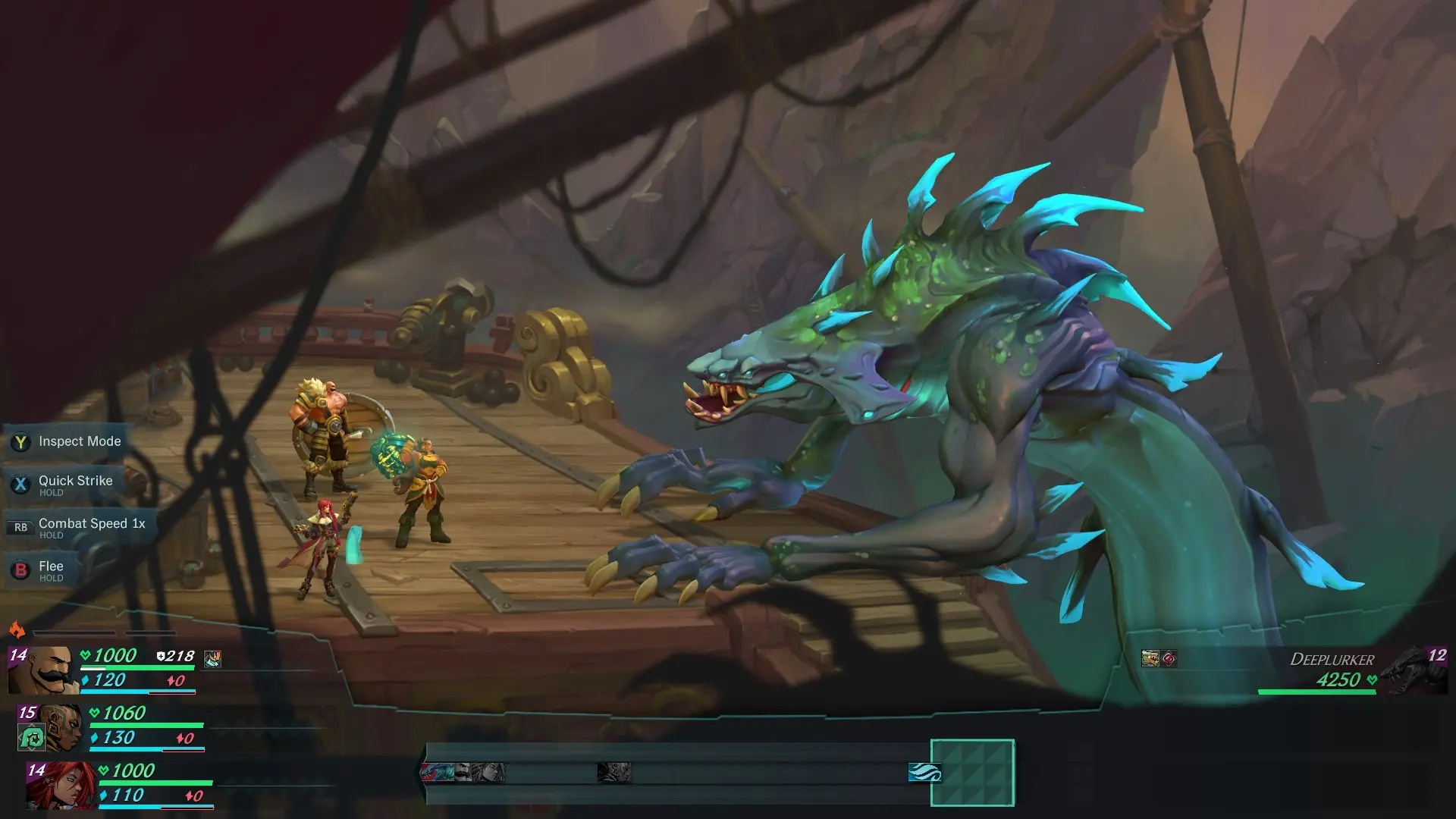
What does this mean in practice? It means that there are many parameters to consider in every battle, even when it comes to performing a single action or a simple spell against one or a group of enemies. Sometimes, the only way to prevent an enemy from performing a crushing move against us is by hitting them via a specific lane. As an example, using Speed Lane often allows us to kill the enemy mob before it can even...catch its breath, while in other circumstances, if we can't catch up to the enemy's movement, it might be a good idea to eventually choose Power Lane to inflict maximum damage. Later on, choosing the "right" lane plays an even bigger role in the various hero abilities we unlock as we progress through the adventure, such as the very useful ability to debuff the negative statuses of our party members if we use the Power Lane instead of another one. As if all this wasn't enough, the "luck" factor is also enhanced with the inclusion of Wildcards, random events that affect both our team and the opposing team (such as healing, armor, attack up, etc.) and participate equally in the battle timeline.
Therefore, from what one understands, the combat system is considerably more deep and complex than one would expect. A fact that is reinforced by the excellent levelling system it has, as well as the runes. There are dozens of abilities that, with the upgrade points we gain, we can customize them differently through three tiers (e.g. will one ability do more damage or raise its critical damage chance?), while using runes, we obtain passive abilities that can really make a difference. Remarkably, any choice we make in upgrade points or runes is not final, as we can very easily choose something else via the game's menu without any consequence.
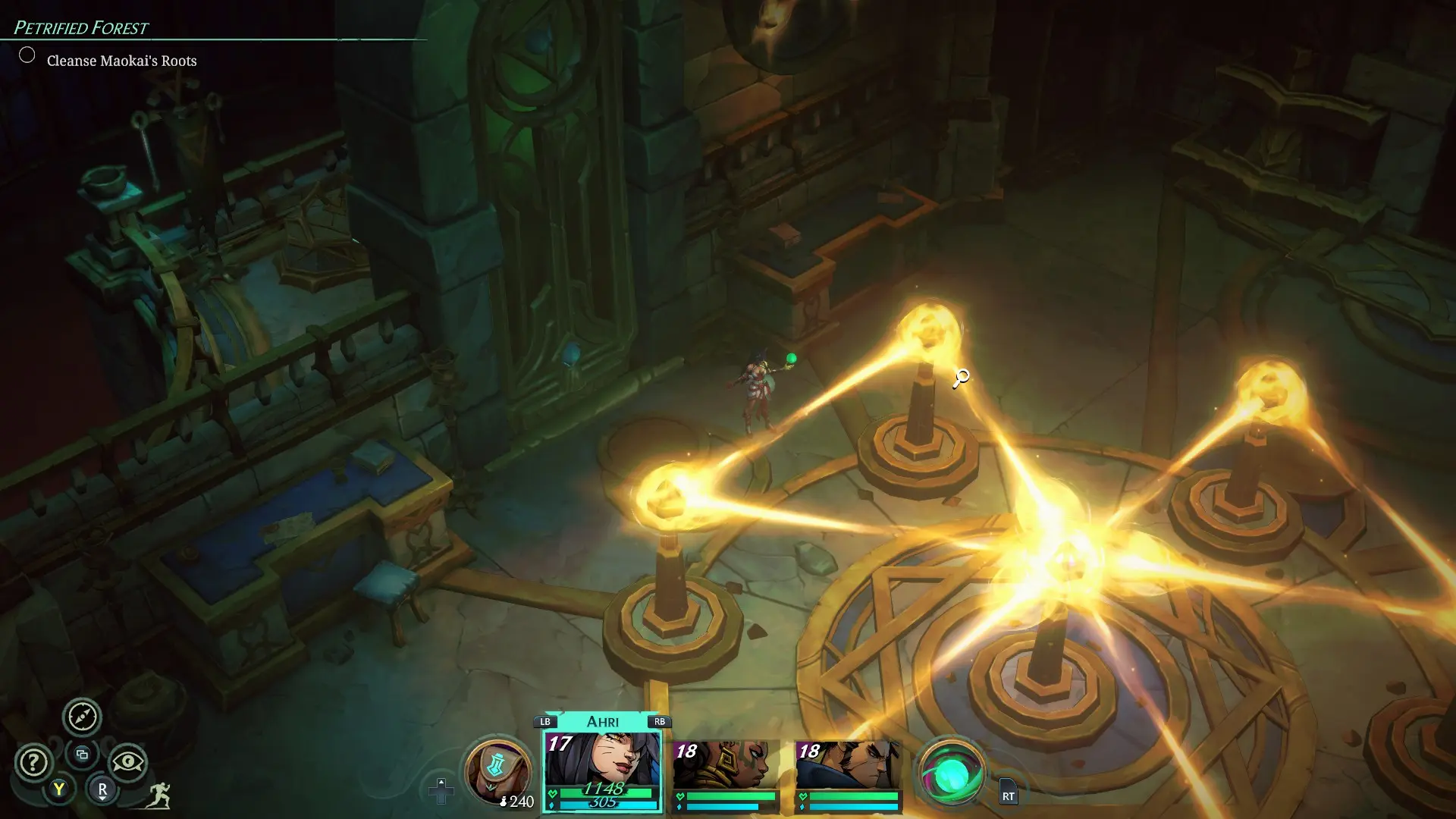
Ruined King in general is a game very open to experimentation. Although each character has their own, clear, role in the game (e.g. Illaoi is a healer, Braum a pure tank, Pyke a debuffer and DPS etc.) and some of their abilities are considered must-haves, we can customize them as we see fit. Coupled with the simple and apt enchantment system, where we power up our equipment depending on what we want to achieve (high haste, regular healing or increased critical damage?), it's really worth looking into the plethora of options given to us.
Certainly, at the beginning of the game it is possible to feel overwhelmed by the amount of information provided. However, thanks to the smooth introduction of the player to its gameplay mechanics, as well as the medium difficulty level (at least on Normal), it doesn't take long before they become second nature. Which allows us to enjoy the other features of the game.
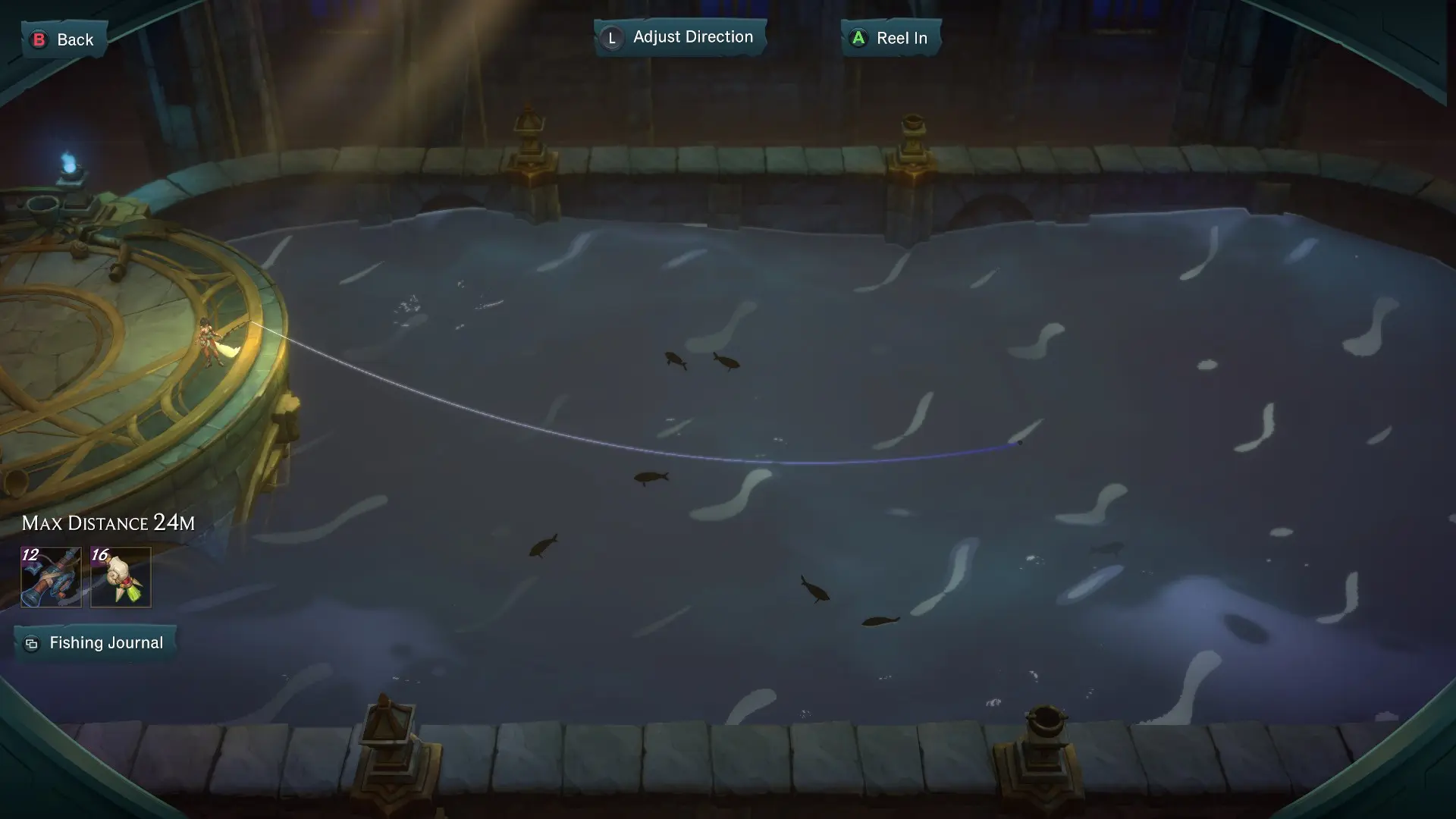
This includes the exploration of the game's world, which has just as many secrets, much it may not seem like it at first, due to the lack of fog of war on its maps. Especially with each character's individual abilities, there are several spots in the dungeons that can only be accessed if you have a specific hero in the party, which usually lead to useful loot. Aside from that, there are several environmental puzzles throughout the campaign, not particularly difficult, but perfect for breaking up the monotony of the battles, and many of the side quests we undertake can have negative or positive outcomes depending on the answers we're asked to provide. As a result, if we screw up somewhere, we may fail to obtain a good item or alternatively gain another.
However, not everything is rosy in the world of Ruined King. The main issue we may face are some glitches and bugs that are likely to affect the completion of some quests or the proper use of some abilities. However, patches appear on a regular basis and in our playthrough we didn't find ourselves in a gamebreaking situation, but we have to let you know. Also there definitely should have been a better map interface, which includes a few unnecessary clicks and is confusing to say the least. Especially with the complete lack of mini-map, where every now and then we are forced to pause the action to check the map, it would have been more than welcome to have more fast travel points (especially within the town of Bilgewater).
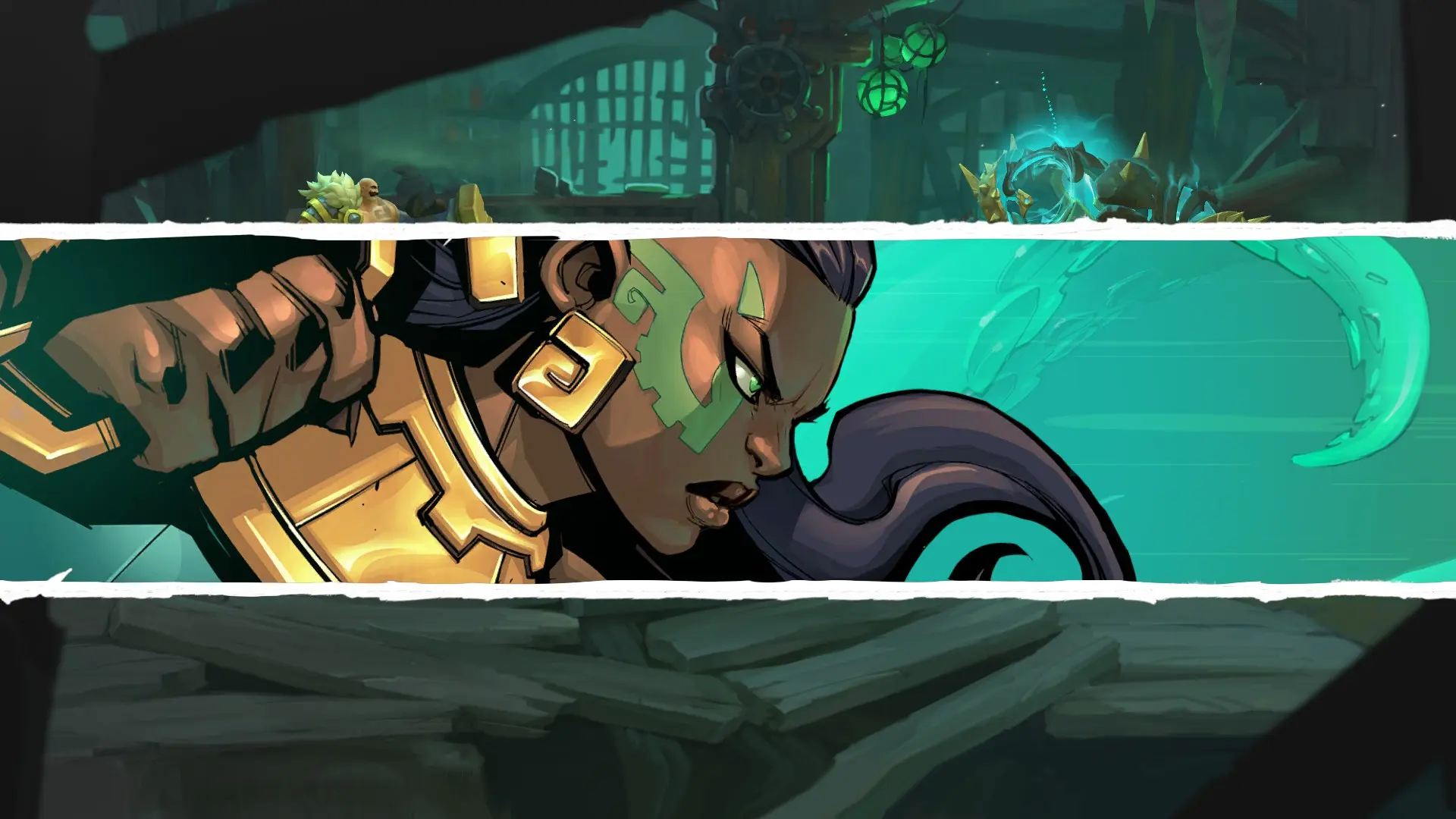
However, the truth is that the aforementioned drawbacks hardly spoil the overall impression that one gets from Ruined King. It is an enjoyable adventure of at least 25-30 hours (longer if one intends to complete all the bounty hunter quests, engage in fishing and locate all the Legendary Weapons), which includes as icing on the cake, a work of art. The cartoonish graphics are of unparalleled quality, at the superb artistic level that Airship Syndicate and Joe Madureira's "brush" have become accustomed to, the soundtrack is thrillingly epic and the voice-over is rendered with some of the best actors we've heard in recent years. The high production values are undeniable.
In conclusion, Ruined King is an excellent...western JRPG and is one of the most pleasant surprises of the year. Combining an extensive and interesting campaign, a well thought out battle system, lovely graphics and impressive soundtrack, it will satisfy turn-based RPG's fans to the fullest. Highly recommended.
RATING - 87%
87%
"I am inevitable"
An excellent turn-based JRPG that impresses with the richness of its lore and its comprehensive battle system.






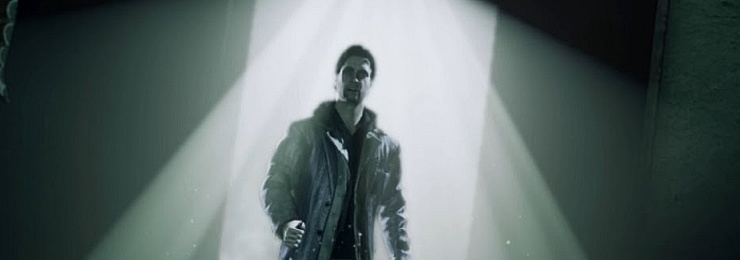
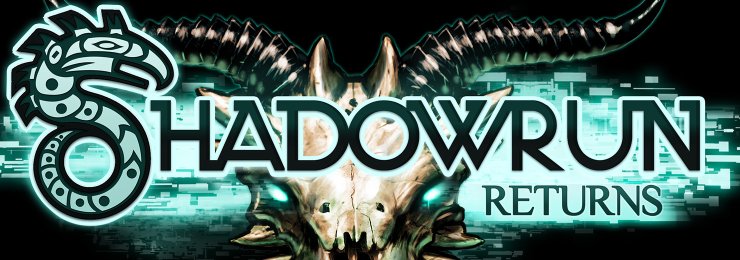

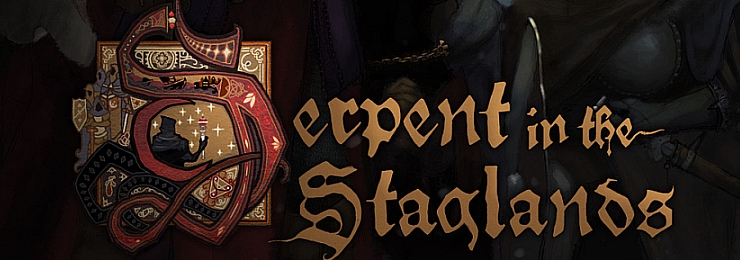
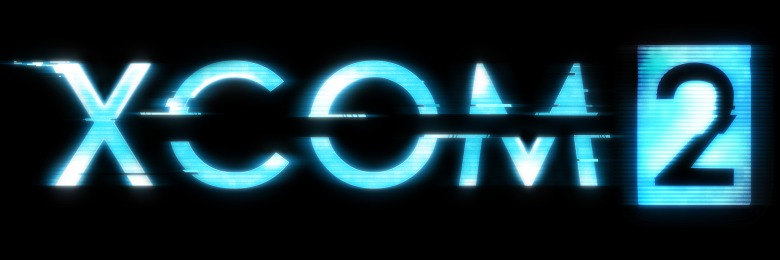

Τόσο αυτό, όσο και το Arcane ήμουν έτοιμος να ρίξω σκληρό pass, [S]λόγω συνειρμών με no life boomers που είχαν αφίσα την Akali πάνω από το κρεβάτι[/S] μιας και επαφή με το LoL σχεδόν μηδενική.
Διαβάζω θετικές εντυπώσεις παντού όμως και θα τους δώσω μια ευκαιρία. Λογικά το ίδιο με το Legends of Rese… Runeterra.
Πάμε λίγο το άσμα
[SPOILER=”Pentakill!”][MEDIA=youtube]H7aWVd5brow[/MEDIA][/SPOILER]
Στα περί lore, πόσο ενδιαφέρον/immersive θα το χαρακτήριζες για κάποιον με ανύπαρκτη σχέση με το LoL; Κατά τα λοιπά, φαίνεται πολύ δυνατό.
Έχω κλείσει 25 ώρες, πολύ κάλο παιχνίδι ως τώρα. Ως story μια πρότερη σχέση με το setting ενισχύει κάπως την εμπειρία αλλά και δεν είναι και τελείως απαραίτητη. Δεν είναι σαν το Arcane βέβαια που εξελίσσεται πολλά χρόνια πριν.
Για δυσκολία θα έλεγα το Veteran (δεύτερο πιο δύσκολο) κρίνεται τουλάχιστον απαιραίτητο για ικανοποιητική πρόκληση. Ως [S]κλασσικός μαζόχας[/S] σκληρός καριόλης που είμαι το ξεκίνησα στο Heroic (το πιο δύσκολο) και αφού έφαγα λίγο τα μούτρα μου στην αρχή προσπαθώντας να κάνω sidequets αντί να προχωρήσω το main και να αποκτήσω τους 3 πρώτους ήρωες asap αλλά τώρα πάει τραίνο. Τα bosses φυσικά αποτελούν δικό τους (ενδιαφέρον) κεφάλαιο και σε wipeάρουν ανεξαρτήτως δυσκολίας αν δεν αντιμετωπίσεις τους μηχανισμούς τους.
Η αλήθεια είναι ότι ούτε εγώ έχω κάποια σχέση με το σύμπαν του LoL. Είχα παίξει κανά δύο παρτίδες πριν πολλά χρόνια, αλλά ποτέ δεν ασχολήθηκα σοβαρά ούτε με το ίδιο το moba ούτε με το lore του. Οπότε ήμουν εκτός της φάσης τελείως, παίζοντας το Ruined King.
Είναι ενδιαφέρον μπορώ να πω, εφόσον σου αρέσει το κλασικό fantasy setting. Έχει μάλιστα και κάμποσα προαιρετικά journals που μπορείς να διαβάσεις, αν θέλεις να εμβαθύνεις. Λόγω έλλειψης χρόνου δεν τα διάβασα όλα, αλλά δείχνει να έχει πολύ “ψωμί”.